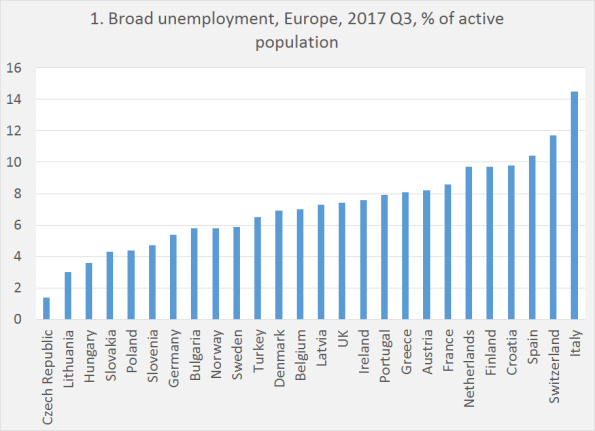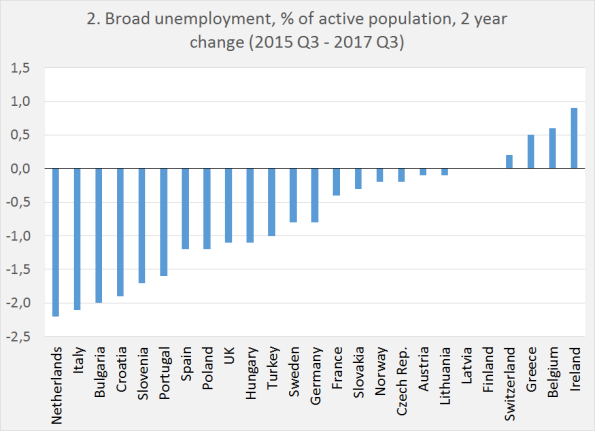Eurostat made new data on broad unemployment available. For some countries (Ireland, Greece, Switzerland), these show a less rosy picture than the ‘normal’ unemployment data. Only the Czech Republic has low normal as well as low broad unemployment though Poland, Hungary, Bulgaria (!) and Germany seem to be heading that way. Altogether, labor slack is still immense. At this moment, wage increases are still low in non-Eastern European countries. Considering the slack this might stay so for a while, though there are more opportunities to obtain a better paying job. In my country, the Netherlands, the labor market shows signs of normalizing. “Help wanted’ signs are becoming are becoming normal (a sign of a normal labor market, NOT of an overheated one) and ‘normal’ unemployment is down
Topics:
Merijn T. Knibbe considers the following as important: Uncategorized
This could be interesting, too:
tom writes The Ukraine war and Europe’s deepening march of folly
Stavros Mavroudeas writes CfP of Marxist Macroeconomic Modelling workgroup – 18th WAPE Forum, Istanbul August 6-8, 2025
Lars Pålsson Syll writes The pretence-of-knowledge syndrome
Dean Baker writes Crypto and Donald Trump’s strategic baseball card reserve
 Eurostat made new data on broad unemployment available. For some countries (Ireland, Greece, Switzerland), these show a less rosy picture than the ‘normal’ unemployment data. Only the Czech Republic has low normal as well as low broad unemployment though Poland, Hungary, Bulgaria (!) and Germany seem to be heading that way. Altogether, labor slack is still immense. At this moment, wage increases are still low in non-Eastern European countries. Considering the slack this might stay so for a while, though there are more opportunities to obtain a better paying job.
Eurostat made new data on broad unemployment available. For some countries (Ireland, Greece, Switzerland), these show a less rosy picture than the ‘normal’ unemployment data. Only the Czech Republic has low normal as well as low broad unemployment though Poland, Hungary, Bulgaria (!) and Germany seem to be heading that way. Altogether, labor slack is still immense. At this moment, wage increases are still low in non-Eastern European countries. Considering the slack this might stay so for a while, though there are more opportunities to obtain a better paying job.
In my country, the Netherlands, the labor market shows signs of normalizing. “Help wanted’ signs are becoming are becoming normal (a sign of a normal labor market, NOT of an overheated one) and ‘normal’ unemployment is down and, with 4,4 %, among the lowest rates of Europe.. Germany as well as a number of countries bordering on Germany (Poland, the Czech Republic, Switzerland, Austria) also know relatively low unemployment. But how about ‘broad’ unemployment, i.e. part time workers who want more jobs, people available but not seeking and people seeking but not immediately available? Graph 1 shows the level of broad unemployment. It shows that broad unemployment in the Netherlands and Switzerland (which also knows pretty low normal unemployment) is quite high. For Italy and Spain broad unemployment data shows that the employment situation is dire and in fact, considering the fact that Greece has relatively low broad unemployment, almost as bad as in Greece. The whole Southern fringe if Europe is an era of lost opportunity. For Poland and the Czech Republic (which knows very low ‘normal’ unemployment) the broad unemployment data corroborate the positive developments of normal unemployment, which has reached the lowest levels since the dissolution of the Soviet Empire.

Looking at changes a somewhat different picture emerges. Two of the high broad unemployment countries, Italy and the Netherlands, show relatively large declines which underscores the positive development of the labor market (though labor slack is still immense). For Ireland, Switzerland and Greece, the increase in broad unemployment to the contrary shows that the development of normal unemployment is not entirely indicative for developments of the total labor market.
